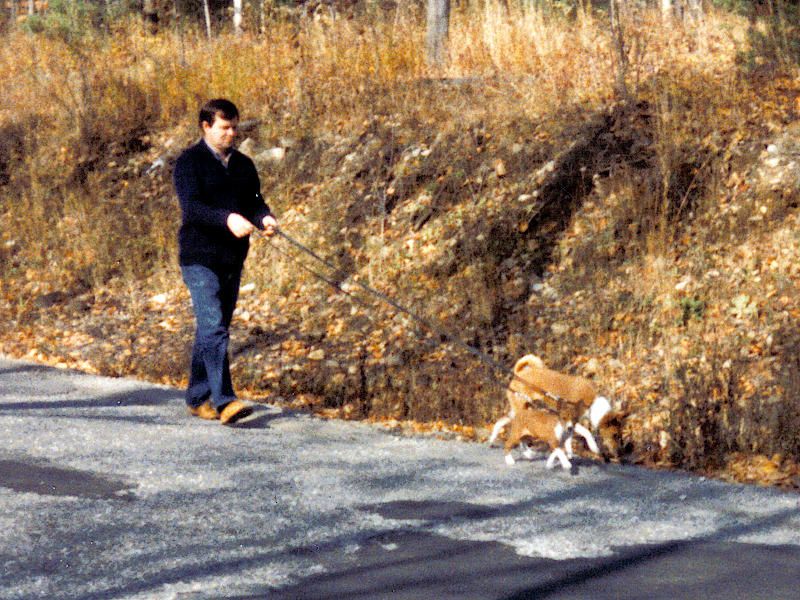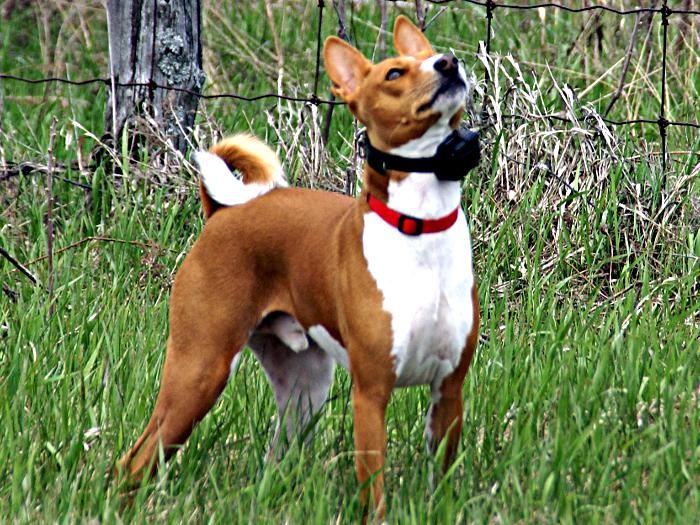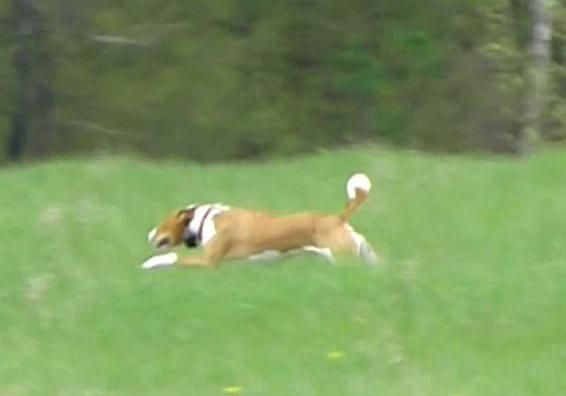biting..again
-
replied to Scagnetti on last edited by
@scagnetti
I think it's probably best for us to avoid spraying, since we have problems with positive reinforcement, we can just do more damage with aversive.Today we went on shorter walks and it was better although I think it's the excitement he gets with runs that are bad for him, because the more he runs, the more he bites.
-
replied to yodabasenji on last edited by JENGOSMonkey
@yodabasenji said in biting..again:
@eeeefarm
One of my coworkers suggested using a shock collar, because it worked for her dog, but I really think that is where I draw the line here.
Someone even suggested to bite him back, supposedly it works :DOoooh. Boy, I don't wanna start an argument, but I'm not a fan of either of those for a Basenji. I'd be heartbroken to hear that any of our puppies were being shocked or bitten by owners for biting.
Basenjis can be extremely sensitive. I'd be afraid that I might cause other behavior issues to surface. I know biting isn't fun, but it's a phase that takes time to break. I prefer Bitter Apple spray for both biting and unwanted chewing. A water spray bottle in moderation.
I much prefer restraint, putting them away in a pen or crate for a few minutes, stopping play, etc. I draw the line at escalating via physical retribution. I don't want my dogs to be afraid of me or any human. I will tell them "NO BITE" loudly. I've also put my thumb in their mouth below their tongue with forefinger under their lower jaw to stop the biting while telling them "NO BITE!" while looking them straight in the eye. They don't like having their jaw held open, but it only lasts a few seconds.
I feel bad that you're going through this, but it will pass.
-
replied to yodabasenji on last edited by Kembe
@yodabasenji
Please don’t use a SHOCK COLLAR! I agree completely w/ @JENGOSMonkey ! I had a friend who used a shock collar to try to control the barking of her dog (not a basenji)- she had left the dog alone for a few hours and the collar somehow “shorted-out” and when she returned the dog was whimpering and almost passed out and her neck was burnt. The shock collar did a continuous SHOCK on the dog. Luckily the dog recovered. Please do NOT use this on a dog - it is inhumane! -
Will add that I have used a shock collar in the past. I was single and working A LOT. I had an Aussie/Border Collie mix that loved to bark all day at squirrels and hummingbirds. A neighbor knocked on the door one day and shared that his wife was going through chemo and radiation for cancer and that she couldn't rest during the day with the incessant barking. I ran out that evening and got a collar. I stopped by his house two days later and asked if the situation was better. He said he hadn't heard barking at all and asked if I'd gotten rid of the dog. I told him no and that I never would. I mentioned the collar and he was mortified. I explained that it was that or have him de-barked. The one I got had multiple settings (I was successful with the lowest setting) and it would buzz four or five times as a reminder before giving a jolt the fifth or sixth time. It did work for him. Different breed though.
Basenjis are just so different than other breeds. At least that's been my experience. Being too aggressive with a Basenji seems to invite more aggression from them or can make them fearful of people.
Sparkle was very stand offish when I first got her (2yo). She wasn't fearful, but she wasn't all that affectionate at first. But then she started to come up to me while I was riding the couch or at the computer. I really wanted to reward that behavior, so I'd stop whatever I was doing and give her attention. She comes up to me all the time now. There's a bit more to that story, but that's an important part of it. I always reward good behavior or behaviors that I'd like to see more of. I ignore or stop behaviors I don't want to see.
Unfortunately, puppies can take longer. From what I can tell Basenjis begin to settle down at about 18 to 24 months. Some sooner and some later. Think about it this way... hopefully your dog will be with you for at least 14 years or more. Thats about 336 months! If you got your pup at 8 weeks that's already 2 months, so 16 to 22 months is a drop in the bucket.
-
replied to yodabasenji on last edited by Scagnetti
@yodabasenji said in biting..again:
@scagnetti
Thank you for the suggestions, I tried luring and picking him up today, when he just decided to sit a few times in the middle of the road and didn't want to move and it went much better.
We were doing the walks much like you've described, we take him somewhere where he can experience grass, fresh ground, woods, but we were overdoing things and didn't realize that being in such rich environment is enough for now. Usually he runs at least half of the walk, if not more.Unfortunately pulling is much of a problem, today he litterally did a flip because he pulled so hard and sudden :/ I do try to stand still when he's pulling and go forward only when he releases, but since he pulls so much, we can do this all day and get nowhere. It's a bit easier on the long leash, since we try to run along (at least for now), but still there is a lot of pulling and I'm really afraid he'll injure himself.
We had first day of puppy school today and it was a disappointment, group trainings are really not for him at this moment, too many distractions.
What are you using walks for, mental exercise, physical exercise, enrichment, all of the above?
I don't understand what you mean when you say he runs on the walk. Are you running too? That sounds to me like he doesn't even know you exist. If this is the case, and he doesn't recognize you at all outside and doesn't realize that you guys are together, then I would work on engagement and relationship heavily and leave the walks for when he gets a bit older. You can give him mental exercise in other ways right now (and if you're using walks for physical exercise, you can physically exercise him in the way I mentioned in one of my posts above). As for enrichment, he's a puppy, so everything is a novel experience, he doesn't need walks for that purpose right now. Perhaps you're doing a bit too much. Also, if he stops and lays down or sits or in any way pancakes on the walk, then he is probably overwhelmed. This tells me that your efforts to exercise him on a walk are in vain. In your case, I would cut the walks for now, make physical exercise a separate activity from mental exercise, and in general, do less. Pick two or three (max) things to work on and focus on them for a little bit without doing too many other things. The 2-3 things I would work on if I were in your position would be engagement, handling drills, and crate work.
As for pulling: What is the leash set-up? How long is the leash? Is he on a harness or a flat collar?
Typically for puppies this young, I put them on the harness, so that they don't learn to pull on the collar. This saves time when I teach leash pressure when they get older. I don't want to desensitize their neck before I teach them how to walk properly on a leash, so I let them pull in the harness. I don't mind if they pull in the harness, because I use the restraint from the harness pulling to train recalls, do crate games, etc. anything I need to build motivation in.
If he's pulling on the harness, it might be unpleasant, but it's okay. If he's pulling on a collar, it will get worse the older he gets.
A tip about pulling: don't do it. If he pulls you, don't allow it, hold the line tight and let him bounce off, but also, don't pull him back, he'll just become more obstinate and refuse to work with you. Also, you'll annoy him and he'll probably be mouthy when you get back home.
When you hold the line tight, release the moment he gives in to the tension and try to get him to come back to you (you may have to use food rewards for this part at first). Basenjis (generally) are very quick to understand leash pressure, even on harnesses. Now, this isn't formal leash pressure, but it's the very beginnings of the dog understanding that the leash can be used for communication. I've found that Basenjis respond very well to the leash as communication, probably because they are such a sensitive breed (in general).
As for the puppy school, I wouldn't worry about it. Before socializing him to other dogs, I'd be more concerned about building value in myself and working on relationship building. I know I'm repeating myself, but it's really quite important.
-
Without actually seeing you with your pup I can only speculate, but the biting compulsion seems unusual. Puppies do nip and bite, but they are generally not fixated on the activity and usually easy to divert. The thing is, why does he feel free to do it to you? There is a respect issue here, he is treating you more like a subordinate than a leader. One thing is that you must not reinforce the biting in any way, which you may have done inadvertently. If he gets what he wants by biting he will continue to do it.
A couple of points here, agree with not using puppy school except for socialization. If you can't teach a pup the basics at home, distraction free, good luck doing it with many strange dogs and smells around! My approach would be to get the basics on at home, then add distractions to proof the training, one distraction being dog classes which adds socialization.
Not a fan of harnesses, but I understand the reasoning. Unfortunately you don't have good control of the head with a harness, which could be a problem with a biter. I also don't understand running on a walk with a pup! Why? Here's my girl Tamu, at about 8 weeks of age, learning how to walk appropriately with assistance from my mature bitch, Lady.

Shock collars, no, not for a pup. They have their usefulness but I would never recommend one for anybody who hasn't taken supervised training to understand when and how much is appropriate. They are very useful for some applications, and when I used one with my last Basenji the level was generally what I could hardly feel on my bare wrist, and the lowest that my dog could even notice. The higher levels are for emergencies, like breaking up a chase when the dog is headed into danger and is too focused on what he is chasing to hear you. Trust me, it works! But it is momentary and then you go back to working level if you need it at all. Some people train with them, I used one strictly for safety and a reliable recall off leash. Perry never resented the collar, but was happy to see it because it meant he was going off leash. He's looking for crows in this picture.

And chasing them!

-
replied to yodabasenji on last edited by
@yodabasenji said in biting..again:
sister's lap for a cuddle and brought with him a chewing toy. And there he was chewing on the toy and my sister was petting him and everything seemed nice and calm for 5 mins and then suddenly he just turned and started biting.
This sounds like resource guarding. Chews and toys do not belong on your lap. Reserve your lap and petting for cuddle time, and restrict toys to the crate and/or floor. That said, once your dog accepts you/your sister as "alpha", you should be able to reach done and take food/toys from your dog without an issue. Until then, I don't recommend that you pet your dog while they are engaged with a chew toy. Allow them to use that time to get rid of the pent up energy.
Try using your voice. "Good Boy!", "No bite!", etc.
@scagnetti said in biting..again:
Honestly, it sounds to me like the dog needs more exercise and possibly small amounts of social isolation.
:clapping_hands: This reinforces good behavior, family bonding, and helps sort out "alpha" issues! I love this advice, but... it seems like you are going to have to do the Goldilocks test to find out how much is "just right".
we got home, he didn't want to come inside and I pulled him in and then he bit me pretty hard quite a few times.
Noone wants the fun to end, so this is not particularly uncommon. Rather than dragging him in the door, step on the leash (literally, put your foot on the leash) and stand there until he calms down (and surrenders). Then give him a related command, "in", "inside", "home", etc. as you calmly pass through your doorway. You and/or your sister first, dog last. Add vocal encouragement when he follows you in, "Good boy", with a scruff on his head when you remove his collar/leash. Then give him time to relax. No treats until he is doing this without a fight.
-
replied to JENGOSMonkey on last edited by
@jengosmonkey said in biting..again:
Ooooh. Boy, I don't wanna start an argument, but I'm not a fan of either of those for a Basenji. I'd be heartbroken to hear that any of our puppies were being shocked or bitten by owners for biting.
I heartily agree. Both these measures are totally abhorrent to my way of thinking.
By using them you are admitting (to yourself at any rate) that you have FAILED to train your Basenji properly.
-
All I can say is have patience. We never thought our Basenji would stop biting, and thought we were the only ones with a bitey little land shark. We tried everything, but he matured and now suffers being bitten by his new sister lol.
Just be consistent and even if you don’t think what you are doing is working, as someone mentioned it won’t stop overnight so just stick with it.
-
Hey guys!
Sorry about disappearing but I decided to quit the internet research, stop panicking and analyzing every aspect of my puppy.
I focused on getting to know him better and creating a connection while applying the methods you suggested above.I needed to figure out how much exercise and other activity he needs, how to calm him down and he really needed to get used to touching and handling, so slooowly things got better.
He still bites, but much much less (I don't need to walk in boots at home anymore!) and the biting is mostly connected to playing and sometimes him not getting what he wants but we're working on that.Thanks again for all the advice, it really helped.
And as you said multiple times, it takes time, patience and consistency and it will get better. -
replied to yodabasenji on last edited by
@yodabasenji said in biting..again:
Sorry about disappearing but I decided to quit the internet research, stop panicking and analyzing every aspect of my puppy.
Sometimes you can have too much of even good advice !!! But I am delighted things are getting better in sofaras you no longer panic -
-
replied to yodabasenji on last edited by
@yodabasenji said in biting..again:
Hey guys!
Sorry about disappearing but I decided to quit the internet research, stop panicking and analyzing every aspect of my puppy.
I focused on getting to know him better and creating a connection while applying the methods you suggested above.I needed to figure out how much exercise and other activity he needs, how to calm him down and he really needed to get used to touching and handling, so slooowly things got better.
He still bites, but much much less (I don't need to walk in boots at home anymore!) and the biting is mostly connected to playing and sometimes him not getting what he wants but we're working on that.Thanks again for all the advice, it really helped.
And as you said multiple times, it takes time, patience and consistency and it will get better.Glad to hear it. I'm happy to hear that you're working on relationship building. This makes things so much easier in general; teaching, living with, etc.
